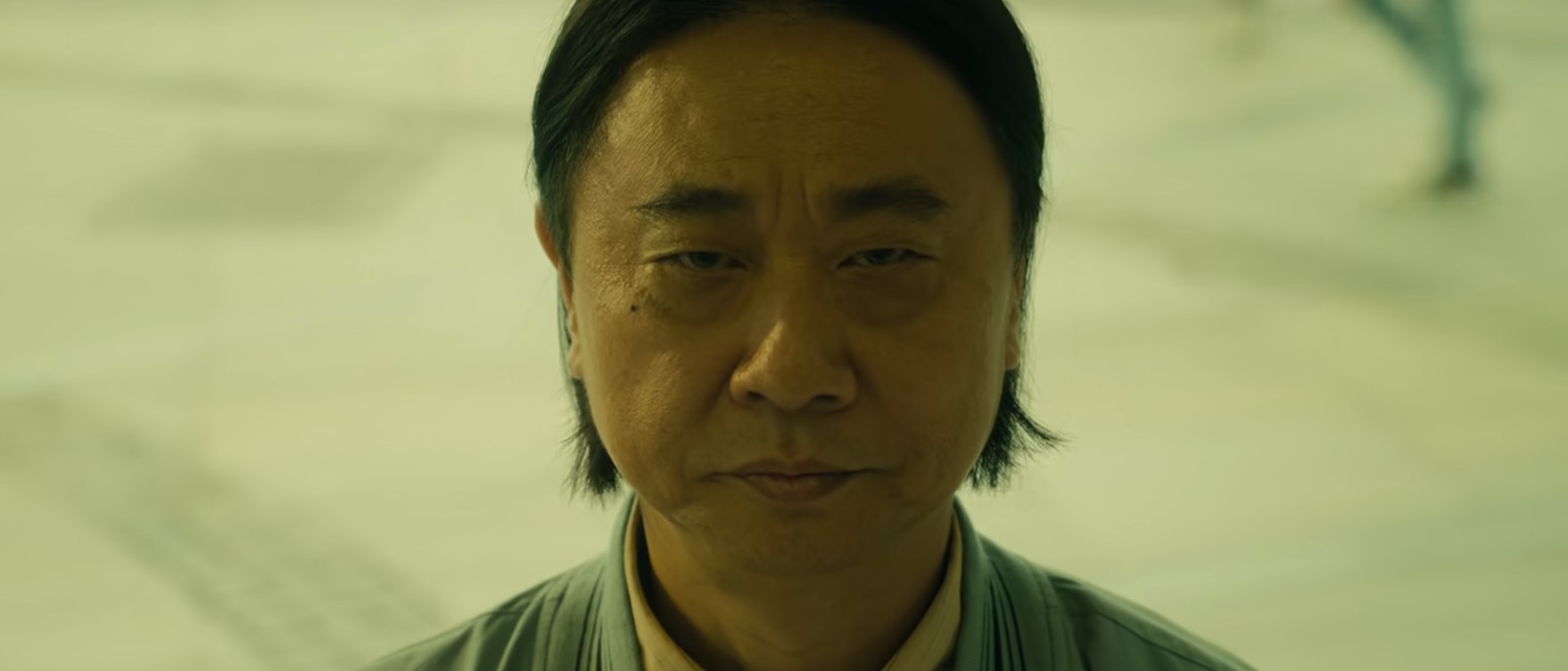Netflix’s crime drama series ‘GG Precinct’ ends with the Hsu Shui-yuan, also known as the Idiom Monster, finding the copycat killer who has been terrorizing New Taipei City by committing murders the same way he had killed two of his students around twenty years ago. Even though Wu Ming-han and Lin Tzu-ching’s initial suspicions prove to be wrong, the former eventually connects the dots and discovers the identity of the murderer who has been causing panic throughout his precinct’s jurisdiction. The crime comedy then concludes with ambiguous developments one after the other, especially concerning the Idiom Monster and his copycat’s actions after their “reunion.” SPOILERS AHEAD.
GG Precinct Recap
‘GG Precinct’ begins with an unrevealed killer murdering a security guard working in a building complex in Gia Gun, New Taipei City. When the police officers arrive at the crime scene, they encounter chicken feathers, fish scales, and two horns on or near the body of the guard. The detectives collaborate with their chief, Chang Yung-kang, to determine that these elements are linked to a Chinese idiom. Not long after the discovery of the security guard’s dead body, another corpse is reported on the grounds of a university, especially near a stone dedicated to the Chinese philosopher Confucius. Chief Chang connects the dead body to another idiom, which takes him back to twenty years ago.

Around two decades ago, Chief Chang arrested a serial killer named Hsu Shui-yuan, a Chinese teacher who dedicated his life to idioms. When two of his students failed to learn the idioms properly, he saw their actions as disrespectful to the culture and literature that scholars and eminent figures have passed on. The teacher then killed the two students based on the idioms they failed to learn, paving the way for his arrest. The brutality of his crimes earned him the nickname the “Idiom Monster.” Since the security guard and PE teacher’s murders are similarly linked to two idioms, Chief Chang concludes that the murderer is a copycat killer who has been following the footsteps of the Idiom Monster.
Ming-han and Tzu-ching consult the Idiom Monster to unravel the identity of the copycat killer. The serial murderer gets transported to the precinct to help the officers. Meanwhile, the criminal strikes again, this time by killing a popular Japanese performer named Mogi Yumi. The singer’s manager lets the authorities know that a food delivery man has been stalking Yumi, which leads the officers to Hsieh Cheng-ta, who apparently has been bothering her. While a group of officers investigate the delivery man’s possible involvement in the murders, Ming-han’s attention turns towards Huang Hsien, a Chinese teacher who had written a book about idioms just like his teacher, none other than the Idiom Monster.

Since Hsien is a former student of the Idiom Monster, Ming-han is convinced that he is the killer. The detective brings the teacher to the station for questioning, but his suspicion turns out to be off the mark when another crime is committed. The CCTV footage the authorities receive from the camera placed outside the victim’s house reveals that the killer is a delivery person, as they initially suspected. A criminal profiler named Li Shu-fen even follows Cheng-ta to determine whether he is the killer. However, it turns out that he has an alibi that clears him from suspicion. Chief Chang falsely states an idiom to provoke the copycat killer and awaits the latter inside an apartment.
Chief Chang’s subordinates hide in the vicinity to capture the delivery personnel. Meanwhile, Ming-han and Tzu-ching take the Idiom Monster to the fourth victim’s house after the serial killer offers his help to identify clues at the crime scene. After taking a look inside the house, he escapes from the officers by attacking them. The copycat killer shows up at Chief Chang’s location and abducts him, revealing to the officers that they are looking for a woman. The detectives and their colleagues meet the police commissioner to talk about the female killer, only for Ming-han to remember a crucial detail that unravels the mystery behind the copycat.
GG Precinct Ending: Why Does Huang Hsiao-yin Kill?
After Chief Chang’s abduction and the Idiom Monster’s escape, Ming-han joins his colleagues and superiors to discuss the case. When the copycat killer shows up to find their chief, it is revealed that she is a female delivery person with a blue helmet. The CCTV footage collected from Mu-ting’s house also unveils the blue helmet. Meanwhile, Chubby, the so-called good-for-nothing cop, says something that sparks Ming-han’s memory. Thinking that the delivery woman is hunting down people because of the low ratings she is getting, Chubby says that he always gives five-star ratings, which makes the detective remember a delivery woman who used to come to their office to deliver food.

The same woman uses a blue helmet and has a connection with Huang Hsien as she confronts him when the Chinese teacher goes on a date with his student in a posh restaurant. Thinking that the woman is one of Hsien’s students, Ming-han questions him, only for the scholar to reveal that she is, in fact, his sister, Hsiao-yin. When the police officers enquire about his sister, Hsien thinks that her life is in danger and reveals the location of a resort where the siblings used to spend their childhood. Meanwhile, the Idiom Monster also realizes that Hsiao-yin is the murderer because he had also taught her. The serial killer is the only person who confronted her homicidal urges when she was a child.
When Hsien and Hsiao-yin were children, the sister achieved more than the brother, leaving an impression on the Idiom Monster. She used to blindly and religiously follow the notions of her teacher, especially concerning the value and significance of the Chinese language and idioms he had been teaching. She saw him as a God-like scholar who imparted unparalleled knowledge and culture to his students, and she was proud that she could receive his teachings and blessings. This blind reverence she had toward her teacher made her consider her distracted classmates as beings unworthy of living. She even wanted to kill them for dismissing his teachings and disrespecting their language, culture, and tradition.
When the Idiom Monster killed the two poor students, Hsiao-yin saw the murders as crimes he committed instead of her. After warning her not to embark on a path of wrongdoing, he went and killed two of his students, which indirectly validated her homicidal urges. For around two decades, the same urges remained inactive in her mind. However, her first victim, the security guard, sparked life into the same. While delivering food in the guard’s building, she came across a notice with spelling errors. While she was correcting the notice, he confronted and scolded her for involving in affairs that weren’t her concern.

When the security guard made it clear that the spelling errors were not his or her concern, Hsiao-yin got triggered, only to see his actions as disrespectful towards her language and culture. Similarly, the food delivery woman comes across the PE teacher when he states an idiom wrong. When she tries to correct him, he dismisses her, saying that he is a PE teacher rather than a language scholar. In his eyes, he does not see the need to correctly state the idioms since language is not his realm. However, as far as the copycat killer is concerned, his reluctance to admit his mistake and acknowledge the value and importance of the idioms makes her kill him.
Mogi Yumi also commits a similar mistake. The singer has raised a dedicated fanbase by presenting herself as a unique personality. She has her own language, actions, and style that makes her stand out among others. Yumi’s obsession with uniqueness makes her change an idiom to suit her understanding and reasoning, which offends Hsiao-yin. In her eyes, idioms are the inventions of scholars, and she cannot tolerate a random singer without qualifications changing an idiom without respecting the people who developed the same centuries ago. In the case of the fourth victim, Hsiao-yin’s motive is different. She kills Mu-ting despite the latter not making an error.
As far as Hsiao-yin is concerned, language teachers who impart knowledge are God-like figures. Their actions are nothing short of noble since they enrich the lives of their students. They are passing on a culture that scholars have refined for centuries. When she learns that Mu-ting has an unacceptable romantic relationship with her teacher, the delivery woman fails to tolerate it. She sees the improper companionship as disrespectful since, in her eyes, Mu-ting is supposed to have devotion and respect toward her teacher rather than romantic or sexual feelings. This is also the reason why she confronts her brother, Huang Hsien. Instead of killing her sibling, she kills the student, possibly also to warn the Chinese teacher.
Why Does the Idiom Monster Save Chief Chang?
When the Idiom Monster finds Hsiao-yin, she is about to kill Chief Chang for provoking her. However, the serial killer stops his student from committing the murder because he sees her unworthy of doing so. Around two decades ago, the Idiom Monster killed two of his students to defend the honor and legacy of the Chinese language. The teacher murdered the two kids for butchering idioms, and he saw his actions as a way of safeguarding the language. He found nobleness in his actions. However, when it comes to Hsiao-yin, he fails to find the same. The teacher sees her merely as a copycat of his actions.

The Idiom Monster sees Hsiao-yin’s murders as a way of imitating him rather than defending the Chinese language. If she had been truly preserving the honor and legacy of the idioms, she shouldn’t have killed Mu-ting, who didn’t commit an error to warrant her death. He tells her that she let her emotions and misunderstandings interfere with her mission, which, in his eyes, made her kill a woman who did not disrespect the idioms by making a mistake. Thus, he criticizes her for imitating his noble actions to do something that is completely unworthy of comparing what he had done for the language and culture.
As far as the Idiom Monster is concerned, Hsiao-yin tarnished the legacy and significance of his actions by imitating the same. Thus, he stops her from killing Chief Chang since he does not want to let her add to the disrespect she has already committed. He murdered his students because he realized that his life must be devoted to defending the Chinese language. Hsiao-yin does not discover who she truly is, which makes her unqualified to be his follower in his view.
Why Does Hsiao-yin Kill Herself?
When the Idiom Monster stops Hsiao-yin from killing Chief Chang and criticizes her, she stoops to disappointment. She has been thinking that her teacher will admire her for following in his footsteps and continuing what he couldn’t do after his arrest. After expecting his appreciation and approval, she has to deal with his harsh words. To correct the mistake she has committed, she decides to kill herself. The idiom Chief Chang falsely states concerns killing someone to warn a hundred others. Since the idiom has been butchered, “one” has to die. Since her teacher stops her from murdering the man who made the mistake, she decides to be the “one” herself.

Hsiao-yin kills herself to earn the admiration of the Idiom Monster once again. She does not want her teacher to think that she has failed to understand him and the depth of safeguarding the language. The copycat killer must have realized that she may find it difficult to live peacefully because her scholar does not value and approve of her. To change his mind and prove how much she cares for the idioms, she slits her throat and kills herself. Since the Idiom Monster chose a life in prison over ignoring his students’ faults, Hsiao-yin possibly wants to make a similar sacrifice, even if it means accepting her death.
Will the Idiom Monster/Shui-yuan Kill Again?
‘GG Precinct’ ends with the Idiom Monster on the run, evading the police officers who have been trying to find him. He comes across a Turkish ice cream vendor who teases him by offering him an ice cream cone, only to take the same away from him. The serial killer sees this “performance” as disrespectful, considering that the vendor has an obligation to give him an ice cream since he promises the dessert. The Idiom Monster approaches this action as going against one’s word or, in other words, disrespecting one’s own word. The action evidently triggers his homicidal urges, but the ice cream seller’s word is not an idiom that is invented and passed on by revered scholars.

Thus, the Idiom Monster may choose to spare the vendor’s life. However, the incident reveals that his urge to kill hasn’t been eliminated yet. Therefore, we can expect him to kill again if the “offense” is severe. The serial killer may also know that a murder he commits will expose his location. So, he may only kill again if the mistake committed is too significant and provoking to ignore. Considering these possibilities, the ice cream seller may not need to worry about his life for now, but the Idiom Monster remains a homicidal threat as far as the officers of the Gia Gun precinct are concerned.
Read More: Best Detective TV Series on Netflix


You must be logged in to post a comment.